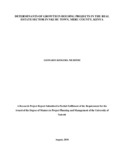| dc.description.abstract | The recent growth in the Kenyan population has led to an increase in the rural-urban shift, with the government estimating a dominant urban dominant country by 2030. Consequently, there have been numerous efforts by the government and the real estate industry to meet the increasing demand for housing in various urban centers throughout the country. However, it is difficult for the government and potential investors to access relevant information about the real estate situation in various towns and cities across the nations to enable for proper planning, which highlights the need to address this gap. This research sought to determine the factors that influence the growth of housing projects in the real estate sector in Nkubu town. The study’s objectives focused at determining the extent to which social amenities, availability of finances to investors, demand for housing, and physical infrastructure influence the growth of housing projects in the real estate sector in Nkubu town. The study utilized a descriptive survey research design that targeted residential real estate projects in Nkubu town. Self-administered structured questionnaires were used to collect data from 144 respondents, selected through a simple random sampling, who are part of the target population of 237 investors in residential real estate projects in Nkubu town. Descriptive statistics and logistic regression were used to analyze the data which was presented in form of tables. The study established that two predictors: availability of finance and demand for housing were significantly associated with growth in housing projects in the real estate sector in Nkubu town, Meru County, Kenya. Availability of finance was found to be significant at .001 level of significance and [Exp (B) 1.640] indicating that it was significantly associated with growth of housing projects. Besides, demand for housing was found the variable to be significant at .05 level of significance and [Exp (B) 1.338] indicating that it was significantly associated with growth of housing projects. It was concluded that access to affordable financing options attracts investors, including investors in housing sector, leading to growth in housing projects. Moreover, when the demand of a commodity, in this case housing, is higher than the supply; there will be new entrants in the market and/or the existing players will expand to fill the market gap hence growth in housing projects. It is recommended that the Kenyan government through the Central Bank of Kenya and relevant legislative organs should take measures to increase access to cost effective credit in the real sector to achieve one of its big four agenda of affordable decent housing for all. The government should also enact laws outlining the minimum standards to be observed when constructing housing projects in towns which are likely to experience rise in substandard housing projects as investors attempt to meet the high demand for housing. | en_US |



